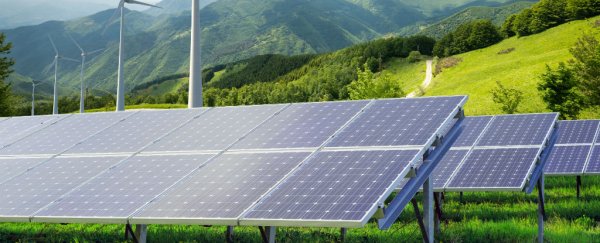One of the limitations of current solar panel technology is the panels need to be facing in a certain direction to make the most of the Sun's rays, otherwise the amount of energy they can absorb drops off dramatically. A newly invented material could make the direction of solar panels much less of a concern in the future.
The material has been produced by electrical engineers at the King Abdullah University of Science & Technology (KAUST) in Saudi Arabia and Taiwan's National Central University. Not only does the glass coating they've come up with soak up sunlight from multiple angles more effectively, it's also able to keep itself clean - the newly treated panels were able to maintain 98.8 percent of their efficiency after six weeks outdoors.
For several years now experts have debated whether solar panels are more productive when facing south or west, with the majority concluding that it really depends on where in the world you live. If the new coating can be produced on a mass scale, not only will panels become more efficient, they can also be placed in all kinds of positions to catch the sunlight.
To create the glass coating, the researchers integrated ultrathin nanorods and larger honeycomb-shaped nanowalls into the existing material: the ability of the nanorods to capture subwavelengths of light and the scattering ability of the nanowalls combine to lead to a boost in efficiency of between 5.2 and 27.7 percent. In the long term, as much as a 46 percent efficiency improvement could be possible, depending on the angle of the light.
Even as the Sun moves across the sky, upgraded solar panels would be able to capture much more energy, and that makes a big difference when it comes to working out the economics of solar power in different regions of the world.
Making solar energy more competitive and scalable is an important part of maintaining the momentum behind it, as indeed was the message at the recent Solar Future 2015 Symposium held at KAUST.
"We've achieved a lot, but we've got a long way to go as well," said Saudi Aramco's Chief Technology Officer Ahmed Al Khowaiter at the Symposium, emphasising the need to "scale up the industry as quickly as possible… maintaining the momentum we've had over the last five years while ensuring the sustainability of growth." The new class coating produced with help from KAUST researchers could play a big role in that.
The team's findings have been published in the journal ACS Nano.
